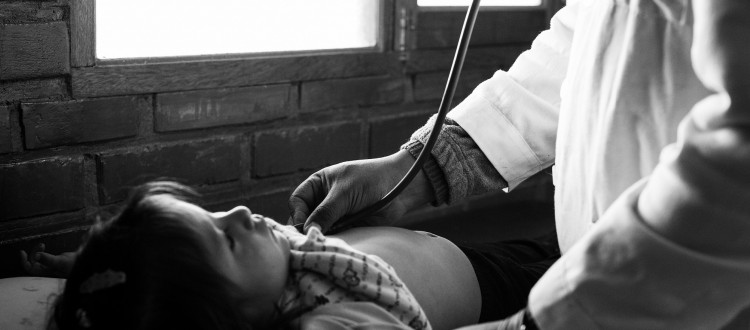Overcrowded homes and poor diet take toll on community’s health
Every day there’s a long queue outside Dr. Alvaro Mendoza Claros’ office. Most of the people waiting in the narrow corridor overlooking the dusty brown slopes of the Andes are young mothers with babies slung across their backs in multicoloured shawls. There are a lot of pregnant women too, some of whom look like they are still in their teens. Young children suffering from a variety of illnesses crawl around on the floor crying as their anxious mothers try to pacify them with snacks of puffed corn while breastfeeding their babies and checking out posters that point out the symptoms of tuberculosis and how to eat a balanced diet.
Around 100 people visit Proyecto Horizonte’s health centre every day. Many of them come complaining of diarrhoea, dehydration, flu or respiratory infections but others have more serious illnesses such as tuberculosis, leishmaniosis – a disease transmitted by infected sandflies that can cause skin sores or affect key organs – and Chagas disease – a parasitic infection that can eventually cause heart failure.
Alvaro, who has been head of the health centre since it opened around ten years ago, says many of the conditions he treats are directly related to his patients’ poor living conditions and their nutrient-deficient diets. There’s no doubt that this community in southern Cochabamba has come a long way since former miners and their families started moving here in the early 2000s in search of a better future, only to end up living in tents initially. But even now most families here live in tiny houses with no running water or sanitation services. Bottles, plastic bags and food wrappers lie abandoned at the side of the roads, dogs roam around freely, the dust that swirls in the wind has a choking effect and trucks spewing out black exhaust fumes pollute the air.
Cramped conditions in homes are one of the key problems, Alvaro says.”Families have very few rooms to live in so that encourages illnesses to spread from one person to another via contact so once someone gets ill, the whole family tends to go down with the same thing and when it’s an illness like tuberculosis, it’s very serious,” Alvaro explains.
The health centre is working towards preventing life-threatening diseases like tuberculosis and rabies by providing free vaccinations and by raising awareness about their causes and symptoms.
But those aren’t the only problems here. Malnutrition is also rife among both children and adults because their diets tend to be heavy on carbohydrates like rice, potatoes and pasta but light on other foods which provide vitamins and minerals. “They don’t eat the necessary nutrients to be healthy, partly for cultural reasons – we are accustomed to a certain type of diet – and partly because their economic situation means they can’t afford to eat all of the things that they need to eat such as milk, yoghurt and meat,” he says.
As in much of the rest of Bolivia, people here also eat a lot of chocolate, cake and dessert – a habit that is encouraged by the small kiosks selling sweet treats galore on almost every street corner, outside schools and even outside the health centre. And that, combined with a nationwide passion for fizzy drinks, affects their dental health too – many people suffer from tooth decay or have missing teeth so the two dentists who work at the health centre have their work cut out doing treatments and raising awareness about the importance of dental hygiene.
All of our health services are provided either free of charge or at a rate that is affordable for people in this poor community but we couldn’t do this without your help. Save lives, heal sick babies or give children the gift of a healthy smile by clicking here. A donation of just $10 would cover the cost of a medical check-up for an entire family while a donation of $20 would enable an entire family to get their teeth checked out by one of our dentists.

